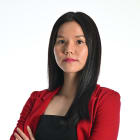Would Singapore's culture of competitiveness stand in the way of a 'we first' society?
Prime Minister Lawrence Wong's call for a "we first" society has sparked conversations about the need for more inclusivity and solidarity. However, this would require more than individual goodwill, observers say.
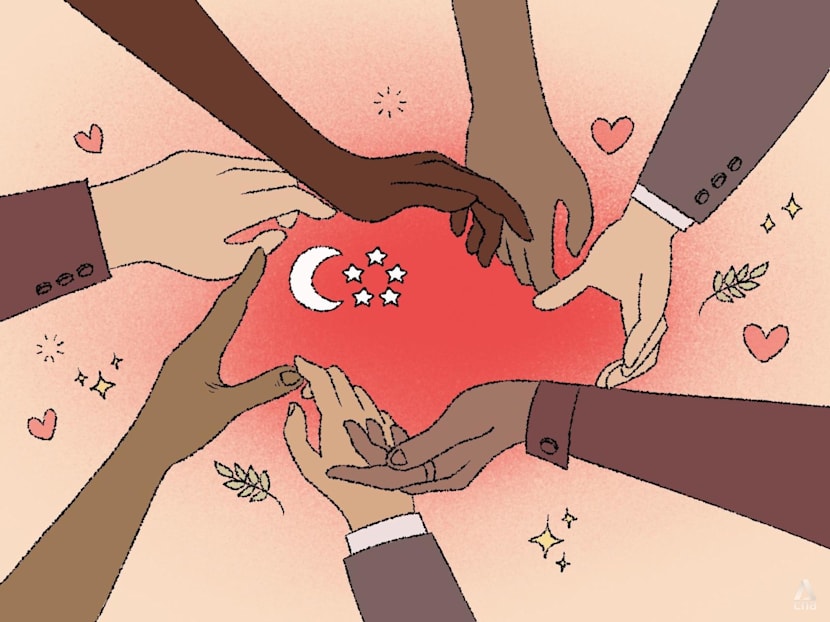
To some people, "we first" means fostering inclusivity, while to others, it is about stronger safety nets or a fairer system that softens the harsher edges of meritocracy. (Illustration: CNA/Nurjannah Suhaimi)

This audio is generated by an AI tool.
Every other Sunday, Mr Chia Jun Hou, either alone or with a friend, buys several meals from struggling hawkers across Singapore and then delivers the packed food to various nursing homes.
The 45-year-old operations manager and his friends started this project, calling themselves Daokachiu, or Hokkien for "lend a helping hand", in 2021 when hawker centres went silent during the COVID-19 pandemic.
"We believe that Singaporeans should contribute in any way we can," he said.
"The smiles from elderly folks and the thumbs-up from hawkers are what keep us going and remind us why we do what we do."
It is this spirit of giving and ground-up action that Prime Minister Lawrence Wong likely had in mind when he recently called on Singaporeans to help him build a "we first" society.
In his 2025 National Day Rally speech on Aug 17, Mr Wong envisioned this society, where citizens would strengthen bonds with each other instead of just looking out for their own self-interests.
"To keep Singapore going, we must be a 'we first' society, because if everyone only thinks about 'me', and puts 'me' ahead of 'we', then we are finished. Society will fray, and things will fall apart," he said.
He added that in this "we first" society, citizens would take up shared responsibility for each other, instead of depending on state support.
"We certainly do not want to end up as a society where people rely solely on the government."
Echoing Mr Wong in a speech at the opening of Singapore's 15th parliament on Friday (Sep 5), President Tharman Shanmugaratnam said that building a "we first" society starts in the community, with neighbours supporting one another and citizens leading ground-up initiatives.
It also means making giving and volunteering a way of life, and building a culture of contribution beyond personal achievement, he said.
He added that "we first" is also about everyday values and simple acts of care, from offering a seat on the train to lending a hand in times of need, which he called "the threads that hold our social fabric together".
While on its surface, the idea sounds straightforward enough, CNA TODAY found that Singaporeans have a range of interpretations of the concept.
In conversations with sociologists, civil society and community leaders, as well as organisers of ground-up movements, it became clear that there is much more to it than the core idea of putting others before self. Each group sees a different gap that "we first" is meant to fill.
For some, it is about building a more inclusive country, while for others, it is about providing stronger safety nets so that people can give more of themselves, knowing they are supported.
And there are also those who feel it is about building a fairer society that softens the sharper edges of meritocracy.
WHAT "WE FIRST" MEANS TO SINGAPOREANS
Dr Leong Chan-Hoong, the head of a social cohesion research programme at S Rajaratnam School of International Studies (RSIS), said that to him, "we first" should be about creating an egalitarian society where everyone enjoys equal access to opportunities and resources, regardless of social status or wealth.
"And in order to be truly egalitarian, this society has to be more cooperative than competitive," he added, pointing to Scandinavia and Switzerland as places that have achieved this.
Given Singapore's heterogeneity, the embrace of diversity was also top of mind for several interviewees.
Ms Yulianna Frederika, 27, the founder of Lepak Conversations, a research and advocacy non-profit for Malay-Muslim issues, said that although Singapore is already a place where multicultural groups live in harmony, it could go even further.
To her, a "we first" society is one where people are naturally curious about each other and actively choose to make diverse connections with people from different communities.
"Right now, the thinking is often 'You're different, but I can still be friends with you'," she said.
"What we need is: 'You're different and that's why I want to be friends with you, so I can learn from you and support you.'"
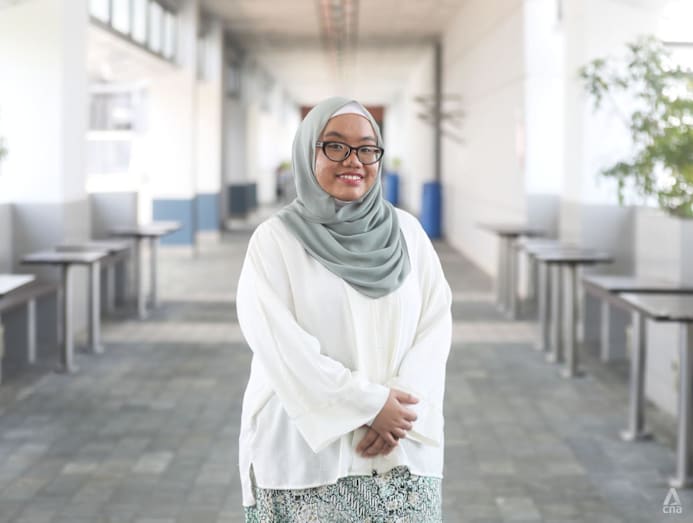
Even before we get to the question of what "we first" means, perhaps we should first define "we", Dr Chew Yi Wei argued.
The senior lecturer in interdisciplinary and experiential learning at the Singapore University of Social Sciences (SUSS) said that although Singapore has made room over the years for diverse voices and opinions, there are still marginalised groups who may not feel that their needs and desires are treated as seriously as those of the majority.
These could include single parents, families of children with special needs, members of the lesbian, gay, bisexual, transgender and queer (LGBTQ) community and even foreigners living and working in Singapore, she added.
"These are small groups, perhaps, but they are growing, and their needs shouldn't be swept under the carpet."
Agreeing, Dr Leong said that in building a "we first" society, Singaporeans must be prepared to consider some contentious questions.
"For instance, would Singaporeans agree to pay more so that migrant workers can travel safely by bus instead of lorry? Or accept a mandatory weekly day off for foreign domestic workers?"
HOW FAR IS SINGAPORE FROM THAT IDEAL?
Underpinning the varied responses about what a "we first" society would look like was one common theme: Caring for others as much as oneself.
Most of the interviewees acknowledged that there are many Singaporeans who already look out for others and do good for the community, but by and large, they felt that this was still a "me first" society.
This is likely because the country's dominant ethos is meritocracy, with a heavy emphasis placed on academic and economic achievement, some experts pointed out.
Success is often defined in narrow terms – grades, career progression, property ownership – and these benchmarks influence how people see themselves and others, they added.
Dr Terence Chong, a sociologist, said: "PM Wong’s ‘we first’ call is the latest in a long line of government attempts to ensure individualism and self-centredness do not take root.
"This is important because Singapore faces every conceivable temptation for individualism and self-centredness to flourish."
Former Prime Minister Goh Chok Tong, for example, called on Singaporeans to help create "a kinder, gentler society", while Senior Minister Lee Hsien Loong asked citizens to strive for an inclusive and resilient Singapore.
However, individualism and self-centredness are difficult to root out from a society that disproportionately rewards outstanding individuals, Dr Chong said.
"We're a hypercapitalist society that promotes competition and rivalry," he added.
"We are a meritocratic society where the talented are celebrated and rewarded, while the less so are believed to be where they are because of what they lack."
Dr Chong also said that while striving for a "we first" society is important, Singapore's dual identity as a nation and a global city makes it challenging.
"As a nation, we need to look out for each other and see fellow citizens as part of a larger family, but as a global city, we need to compete with the world at breakneck speed," he added.
"Every day, we oscillate between these two contrasting identities, and sometimes we fail to see our fellow citizens as part of our national fabric. After all, the traits that shot us to first-world status, like being 'kiasu' (afraid of losing out) and 'kiasi' (risk-averse), are rooted in individualism and the embrace of competition."
Dr Alwyn Lim, an associate professor of sociology at the Singapore Management University (SMU), said that Singapore's increasingly diverse and complex society presents another challenge.
He noted, for instance, the inflow of immigrants in recent decades, as well as the widening divide between those who hold conservative values and those pushing for a more liberal society.
However, despite the structural and cultural barriers, civil society leaders and community-minded business owners told CNA TODAY that they are already seeing the "we first" spirit in action today.
Mr Kristian-Marc James Paul, 31, a co-founding member of SG Climate Rally, a youth-led movement advocating for climate justice, pointed to groups working with people who live in rental flats and neighbours supporting each other, for example.
"Within the civil society space, there's also this idea of solidarity in a broader sense. One group stands up for another, even if the issue (each is championing) is completely different. We stand up for one another because our fundamental humanity binds us together."
Mr Jerome Lim, 39, a third-generation owner of his family's fishball business, Ming Fa Fishball Noodles, offers free fishball noodles to Community Health Assist Scheme (CHAS) card-holders, who receive government-subsidised healthcare support in Singapore.
"I think Singaporeans are definitely moving towards a more 'we first' mindset," he said.
"You can already see it in small but meaningful ways, like pay-it-forward campaigns in some F&B (food-and-beverage) outlets, or the many charitable initiatives happening around us. More and more, people are finding their own ways to give back, so I do feel we're ready to take that next step together as a society."
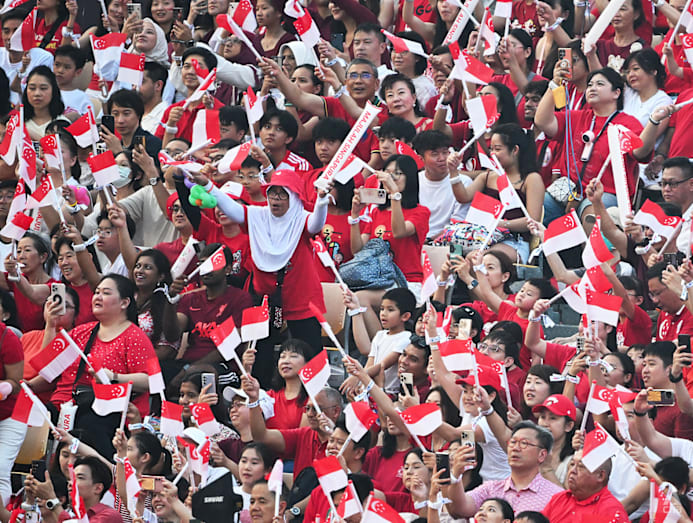
THE GOVERNMENT'S ROLE IN LEADING BY EXAMPLE
Paradoxically, this next step cannot happen without the government leading the way, some interviewees said. After all, citizens will only feel secure enough to help others and be more self-reliant if they know that they have a sturdy safety net beneath them.
Dr Chew from SUSS noted that this is a privilege Singapore can afford as an affluent society because in places facing poverty, conflict or weak institutions, people often have no choice but to resist the state and rely on themselves.
"Singapore is different. Our infrastructure and laws are already provided by the state. But ironically, because we are wealthy and generally compliant, we end up with less autonomy.
"That is why the government must first provide the safety net, before citizens can feel secure enough to help others," she said.
Dr Chew added that even though citizen-led initiatives are vital, they can only succeed if education lays the groundwork. More than policies or schemes, schools shape the mindset and resilience needed for a culture of care.
Younger Singaporeans, she said, are so consumed with competition and fear of failure that they may not have the capacity to invest in the collective good.
"If we truly want a 'we first' society, the pressure of exams shouldn't start so early or be so unforgiving. Children should have time to play, explore and learn to help one another.
"Without that, how can we expect them to grow into citizens who care about the collective good? The entire education system needs a revamp from primary school. The infrastructure has to be there before citizens can take over."
Mr Paul the climate activist observed that change is difficult in Singapore because people tend to look to leaders for direction and the country is not, or at least not yet, a society where people readily self-organise.
In his view, policy and culture cannot be separated – policy must lead, because when it shifts, people's views and ways of living will follow and thus, culture evolves.
"Civil society has a role, too, in creating space for conversations and normalising difficult ideas. But it cannot exist in a vacuum or be the only force for change," he said.
Dr Leong from RSIS said the government's role in cultivating a "we first" society would be to ensure a basic standard of living, with direct interventions in key areas such as housing, education, healthcare and public transport.
Beyond that, the state can act as an enabler, encouraging ground-up initiatives through self-help groups, non-governmental organisations, universities, religious organisations and civil society, he added.
Such support is already visible in initiatives such as:
- The National Volunteer and Philanthropy Centre (NVPC), which promotes volunteerism and giving
- BAGUS (Building All Groundups for Success) Together – a collaboration by NVPC, Temasek Foundation and Tote Board – which helps budding changemakers access networks and resources
- SG Cares, a national movement that rallies Singaporeans and residents to give back through volunteerism and everyday acts of care
- Forward Singapore, a national exercise that engages citizens in rethinking and shaping Singapore's future together
For Mr Wilson Yu, a 38-year-old private-hire driver with ride-hailing firm TADA and a father to a seven-year-old boy with autism, stronger social support and more effective government oversight are essential for a "we first" society to take root.
In his experience seeking support for his special needs child, he said, some government agencies offer good service, but others could do better.
He added that citizens would likely be more inclined to care for others if they themselves feel supported by the organisations and agencies that are meant to help them.
FROM "ME FIRST" TO "WE FIRST"
Those who are already doing the work of building a mutually supportive society are optimistic that Singaporeans are ready to take up the challenge of creating a "we first" society.
Cybersecurity architect Nazmul Khan said, for instance, that he started the group 24asia in 2018 with just four other volunteers with the aim of building ties between residents and migrant workers.
Today, the organisation has more than 250 volunteers who help it to organise free computer classes, cultural shows, blood donation drives and other events for migrant workers.
"Things have improved a lot with many Singapore residents joining as volunteers, but there is still room for integration," the 44-year-old said.
Similarly, Ms Hani Isnin-Racine, 40, the co-owner of The $2.50 Shop in the Chin Swee Road area, has found strength in the trust and generosity of her community, despite having to struggle with tight margins and burnout. She had started her business because she saw that many of her neighbours were unable to afford meals.
"When people see sincerity, they respond with generosity. It’s not just transactional, it’s relational," she said.
For example, some of her customers pay more than they have to or donate ingredients to her, seeing her stall as more than just a source of affordable food but a meaningful cause.
Young Singaporeans are also stepping up in creative ways. Signpost Collective, founded in 2019 by students from the former Yale-NUS College, makes it a point to engage informal street sellers – who often peddle tissue-paper packs and other small items – on a weekly basis.
The aim is not just to provide financial support, but also to tackle the stigma that these sellers are scammers or tied to syndicates, while building trust between them and the volunteers.
Signpost Collective supports informal street sellers across 15 MRT stations, offering practical aid with tasks such as writing emails or filling out forms for taxes and aid applications, while also looking out for their well-being through weekly walkabouts and everyday care.
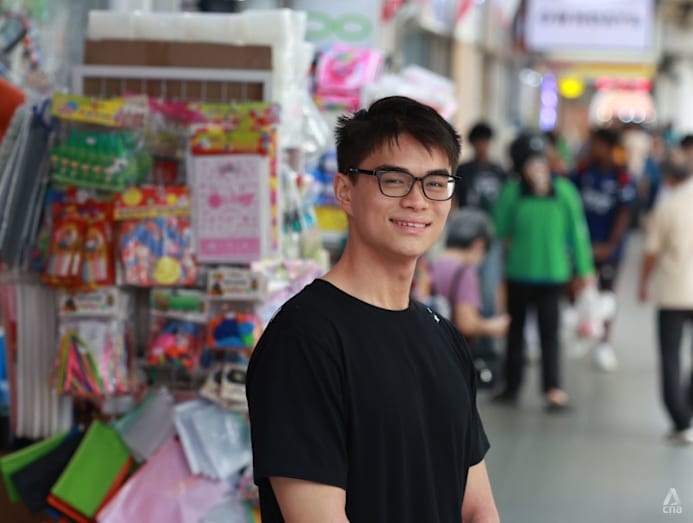
Similarly, in Marsiling, Mr Ganesh Kumar, 40, channelled the grief of losing his mother into creating the "Woodlands Botanical Garden" in July 2020. It is a hillside space that has since grown into a gathering point for neighbours of all ages, with volunteers who keep returning because they feel a sense of ownership and equality.
However, sustaining such efforts, he said, often involves navigating a lot of red tape.
Even something as simple as organising a small performance by volunteers, he recalled, quickly snowballed into a tangle of applications and approvals that had to be attained from various agencies.
"Why do you make it so difficult?" he said.
Others agreed that frustration and burnout are part of the experience, and that community volunteers must learn how to pace themselves.
This was the case with Daokachiu. Mr Chia, the co-founder, said: "Raymond, our treasurer, often plays the role of the realist … He advocated for a fortnightly schedule to avoid burnout and ensure we don't disappoint the seniors we serve."
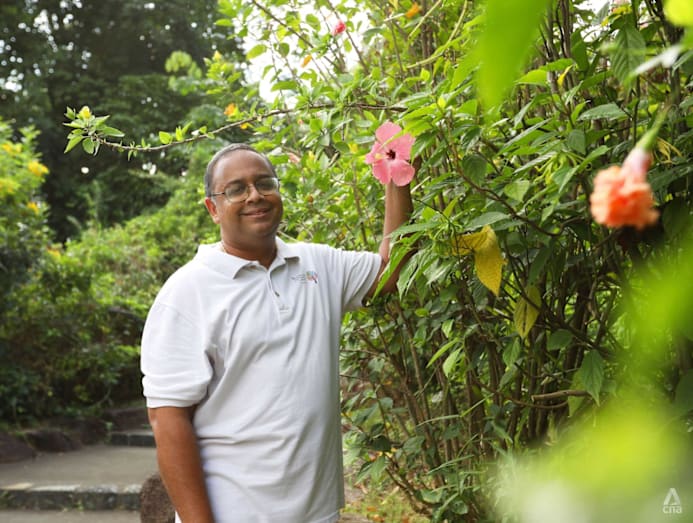
For those who feel inspired to take up the prime minister's call and follow in these Singaporeans' footsteps, Ms Hani from The $2.50 Shop has some simple advice: "Start small, but start. You don’t need a big budget, just a big heart.
"Whether it's offering a pay-it-forward meal, hiring someone who is overlooked or hosting a community event, every act counts."
Even those who are facing struggles of their own can find the capacity to give back in some way, as shown by Mr Yu, the TADA driver with an autistic child.
Mr Yu, a single father, said his finances are sometimes tight, and the daily challenges of caregiving for his son wear him out. Yet, he still offers free or discounted rides to people who are disabled, battling chronic illnesses or in need.
"A ride for me would cost a few bucks of petrol and 20 to 30 minutes of my time. But for them, a S$20 to S$30 ride means a few meals," he added.
"I once saw a woman in a wheelchair coming from a rental flat and I thought, 'Why not just help her?' This is the least I can do. I'm not giving her money, but I can give back in another form."


